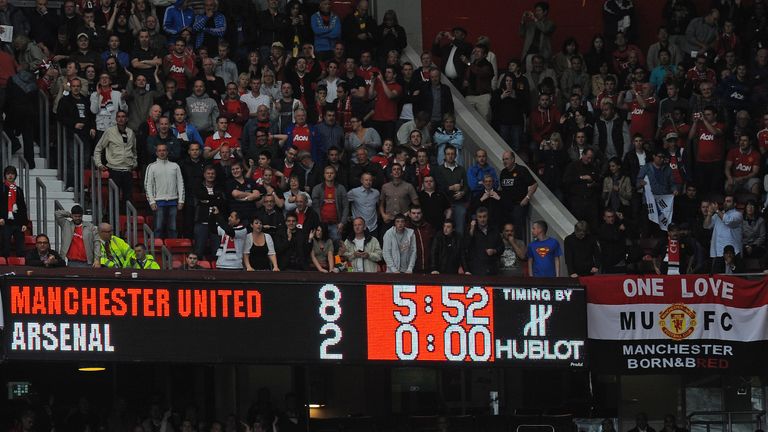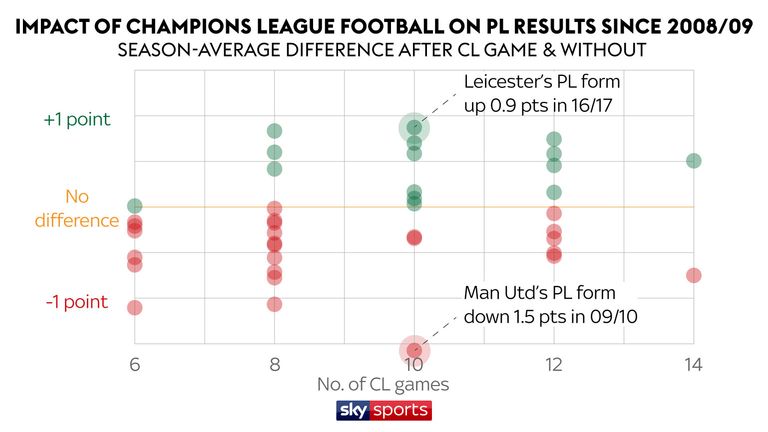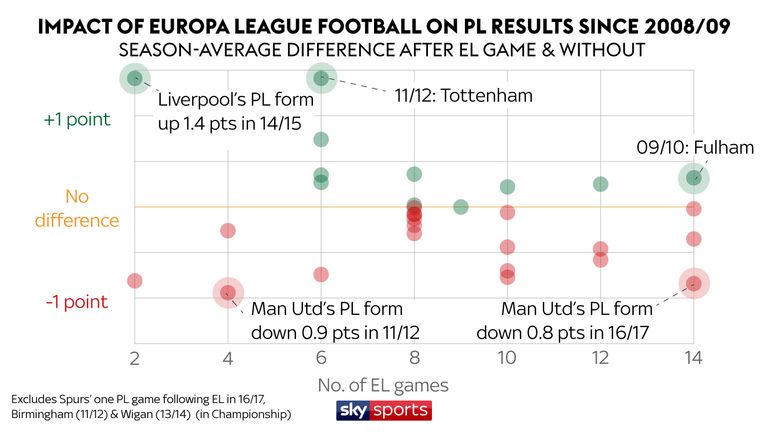Champions League and Europa League impact on Premier League results
Does European football affect Premier League form?

Thursday 20 September 2018 15:12, UK
Does European action take its toll on Premier League results?
Liverpool kicked off their Champions League campaign in style with a 3-2 win over Paris Saint-Germain and Tottenham lost to Inter Milan on Tuesday, while Manchester City lost to Lyon and rivals United swept Young Boys aside in Switzerland.
Meanwhile, Arsenal host Vorskla in the Europa League group stages on Thursday evening, with Chelsea facing PAOK in Greece.
Burnley crashed out of the competition a fortnight ago after failing to progress past the qualifying rounds, with European travels and fixtures possibly contributing to their poor start in the Premier League this season.
But does European football actually affect domestic league results? We took a look at Premier League results directly after European fixtures over the past 10 years to find out...
Champions League
The ones who suffered
Several teams have struggled after competing in Europe's elite competition, with Manchester United's class of 2009/10 recording the biggest slump - picking up 1.5 fewer points after each Champions League fixture that season, on average.
United would have accumulated 15 more points and claimed the title that season - if Sir Alex Ferguson's side had matched the 2.64 points-per-game ratio recorded during weeks without European football.
More recently, Tottenham suffered an average dip of 1.1 points per game after their six Champions League fixtures in 2016/17, while Chelsea slumped one point after each of their eight midweek ties last season.
The ones who improved
Conversely, Leicester's European adventures in 2016/17 produced immediate spikes in league form, with the then-reigning champions picking up an extra 0.9 points per game after their 10 midweek fixtures.
Indeed, United benefited from a similar bounce in 2012/13 (+0.8 points per game) and the following season (+0.7 points), while Chelsea also spiked after Champions League exertions in 2013/14 (+0.7).
Summary
So, the overall impact of Champions League football produces a dip of just -0.1 points per game, but only 13 out of 46 Premier League teams have improved domestic results after midweek games over the past 10 years.
Europa League
The ones who suffered
Manchester City suffered a notable dip in Premier League form (-0.9 points per game) following their four Europa League fixtures in 2011/12.
City recorded a similar decline in 2010/11 of -0.8 points per game, as did eventual winners Manchester United in 2016/17.
The ones who improved
At the other end of the scale, Liverpool achieved a 1.4 points-per-game boost during 2014/15 - but they only played two Europa League fixtures after being dumped out of the Champions League.
Tottenham benefited in 2011/12 (+1.4 points per game) and 2008/09 (+0.4 points per game), as did Southampton in 2016/17 (+0.7 points) and Fulham in 2011/12 (+0.4 points) - in addition to when the Cottagers reached the final in 2009/10 (+0.3 points).
Summary
The impact of Europa League football also reduces Premier League form by -0.1 points per game, on average - while only nine out 32 teams recorded an uplift in domestic form.
Unlike the Champions League, there appears to be a link between the number of Europa League games played and a dip in Premier League form - only six of 21 teams that played eight games or more improved league results.
Conclusion
So, the majority of teams suffer a slight dip in form immediately after a European fixture, suggesting midweek exertions do affect Premier League form - although Manchester City have suffered most.
With the impact of Champions League and Europa League commitments combined over the past decade, Manchester City's form has dropped 0.4 points per game, on average - more than any other club.
If reading on skysports.com, comment below to get involved in the debate, but please adhere to our House Rules. If you wish to report any comment, simply click on the down arrow next to the offending comment and click 'Report'.












